Jim Pearsall
Reviews By Author
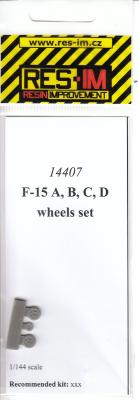
|
F-15 WheelsPublished:
Building 1/144 can be great fun, but sometimes older kits need a little boost to bring them up to the standards we’ve come to expect from newer (but more expensive) kits. A case in point is the LS 1/144 F-15, which has a couple of things which could use improvement. The wheels on the LS kit are correctly sized in diameter, but they look like ATV tires. They’re too wide, and the sidewalls are rounded. So the Res-Im tires are a pretty good improvement. There’s a comparison photo below. I started out to do this review on the Minicraft F-15, but the tires are molded onto the landing gear legs. Too difficult for me, especially in this small scale. See the picture below to see the Minicraft LG. Once I had the F-15 almost complete, painted, decals installed, I was… more |
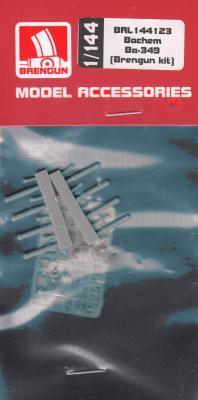
|
Bachem Ba.349 Natter Upgrade SetPublished:
The KitThis is the detail upgrade for Brengun’s Bachem Natter kit, BRP144001 which I have previously reviewed. The Brengun Natter kit is a double kit, 2 in a box. The PE/resin upgrade also comes as a double set. So you get two sets of rocket motors, and PE for two Natters. I’ve scanned the PE Fret to show the parts are doubled up. It’s also interesting that there are six part number 8’s and five part number 11s. I needed all of these, as they’re VERY tiny and easily lost. The PE upgrade is for the cockpit, the rocket motor mounts, and some exterior additions. The… more |
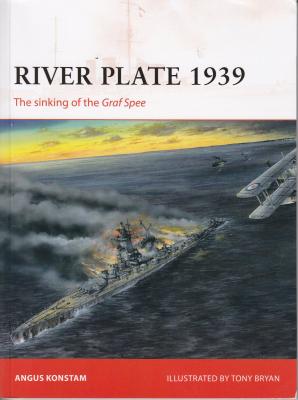
|
River Plate, 1939 – The Sinking of the Graf SpeePublished:
I was somewhat aware of the happenings at Montevideo, Uruguay some time in early WW2, but this book gave me a clear picture of what happened, and why it happened like it did. Mr. Konstam has put together a thoroughly researched book, with all of those details that make the history come alive. But the book is also very well written, to the point where I looked up and it was well past my bedtime, but the book held my interest so very well that I couldn’t put it down. The ShipThe Admiral Graf Spee was one of three “Pocket Battleships” of the Kriegsmarine at the beginning of the war. The ship was limited by treaty to no more than 10,000 tons. There was no limit to the armament, so the Graf Spee carried six 11 inch (28cm.) guns in two turrets. In order to meet the 10K ton… more |
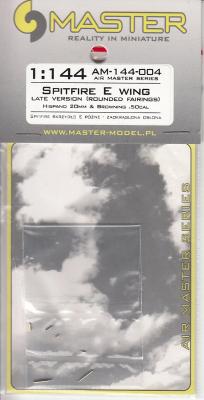
|
Spitfire E Wing Late - Hispano 20mm & Browning .50cal in FairingsPublished:
Master Model has a line of finely done brass parts which upgrade the kit they’re designed for. These parts are great if you have an accident and one of the cannons breaks off. The other possibility is AMS, as the machine guns are far superior in detail to the little nubs provided on the kit wing. See the parts comparison below. The Spitfire IXe had a pair of 20mm cannons in the wing. These had been moved outboard to allow more ammunition for the Browning .50 caliber machine guns. The cannons stuck pretty far out from the wing, but the Brownings barely showed. The “fix” for the Brownings was to put the muzzle inside a tube which extended from the wing. The kit contains six parts, two cannon barrels, two .50 muzzles and the wing tubes for the Brownings. The cannons for… more |
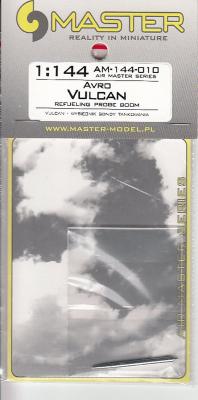
|
Vulcan Refueling ProbePublished:
This is another of those little parts from Master Model of Poland which can save your model. In this case, it’s the refueling probe on the 1/144 Vulcan. The kit part is plastic. It sticks out there most of an inch in front of the rest of the aircraft, just inviting someone to bump it and break it off. With this metal replacement, you won’t have to worry about that. In fact it could cause injury, as it’s finer than a straight pin, and if you hit it, it could hurt. The PartWhat you get in the package is a small piece of finely turned metal. I’m not sure if this is brass, as it’s silver colored. The instructions say to remove the kit probe from the base part and drill the hole in the base part. Since I had already finished this Vulcan, I didn’t think I could do… more |
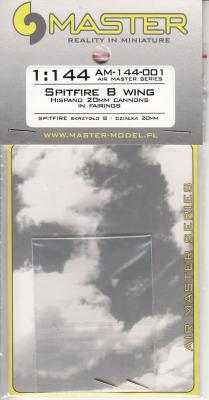
|
Spitfire B Wing - Hispano 20mm cannons in fairingsPublished:
Master Model produces beautiful little brass parts for aircraft. Their particular thing is those easily broken and lost parts, pitot tubes and wing guns. I also recently did a review on their gun barrels for the 1/144 Ju-87G Stuka, another set of easily broken parts. The instructions are pretty basic, so you need to have some modeling experience to figure out what to do. On the other hand, once you’ve done one of these, it becomes pretty clear what the instructions want you to do. AssemblyI started with Minicraft Spitfire Vc which has been on my shelf for a while. I began by cutting off the kit supplied guns with a sprue cutter. Master makes their guns a little longer so there’s a solid mating surface between the kit wing and the cannon barrel. After… more |
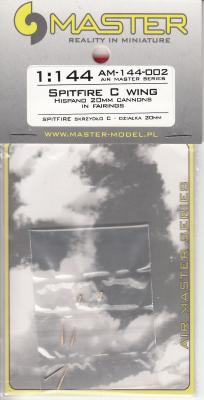
|
Spitfire 9c GunsPublished:
Master Model produces finely crafted small detail parts for models which have been damaged or may be subject to rough handling. Their collection of antennas and pitot tubes are invaluable for the modeler whose friends (or former friends) handle models less than carefully. There’s a picture below, which appeared as a cartoon in an early IPMS Quarterly. This particular set is for the cannons of a Spitfire IXc. The C wing had either one or two cannons in each wing, and possibly two more .303 machine guns outboard. The kit includes two sets of cannon and one set of stubs, so you can do either of the C wing cannon options, depending on how the aircraft you’re modeling was armed. AssemblyI started with an Eduard Spitfire IXc which I had previously finished. This… more |
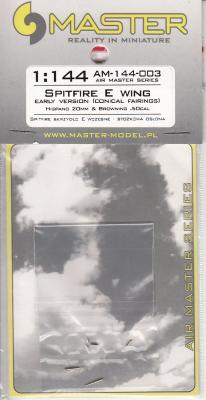
|
Spitfire E Wing Early Version Hispano 20mm & Browning .50calPublished:
Master Model produces finely crafted small detail parts for models which have been damaged or may be subject to rough handling. Their collection of antennas and pitot tubes are invaluable for the modeler whose friends (or former friends) handle models less than carefully. There’s a picture below. This particular set is the guns for a Spitfire IXe. The Spitfire IXe had a pair of 20mm cannons in the wing. These had been moved outboard to allow more ammunition for the Browning .50 caliber machine guns. The cannons stuck pretty far out from the wing, but the Brownings barely showed. The “fix” for the Brownings was to put the muzzle inside a tube which extended from the wing. The kit contains six parts, two cannon barrels, two .50 muzzles and the wing tubes for the Brownings… more |
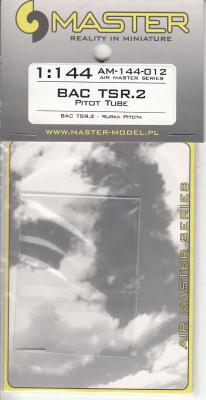
|
BAC TSR.2 Pitot TubePublished:
There are three 1/144 TSR.2s available currently. Great Wall Hobby and Pit Road appear to be the same model in different boxes. I could be wrong here, but I don’t think so. On the other hand, the third 1/144 TSR.2 kit, which I have in my stash is the Kami de Korokoro kit. Since it’s a paper model, I’ve put it off. I’m sure I won’t need a new pitot for the paper plane. The model I used is the Pit Road kit, in “what if” markings for the Gulf War. InstallationInstallation instructions show 3 steps. I’ve expanded that to 4
|
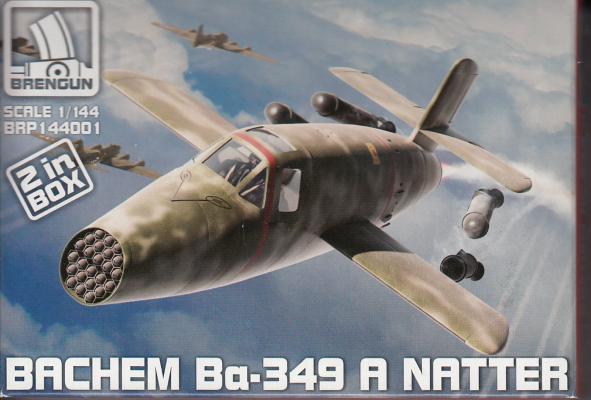
|
Bachem Ba.349 NatterPublished:
The AircraftThe Bachem Ba 349 “Natter” was another of those last-ditch attempts by the Axis powers to stave off defeat. The Japanese had the MXY7 “Okha” which was supposed to stop the US fleets off Japan. The Natter was supposed to shoot down the fleets of bombers which were reducing the cities of the Reich to rubble on a daily basis. The concept here was an aircraft which needed no airfield, but was launched vertically using rockets to get the aircraft to altitude. There was a pilot, but his job was to aim the rockets contained in the nose at the bombers, and pull the trigger. An autopilot was supposed to guide the Natter from take off to the intercept area. After the rockets were fired, the Natter was supposed to descend to lower altitude, where the “pilot” would… more |
